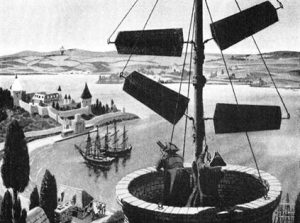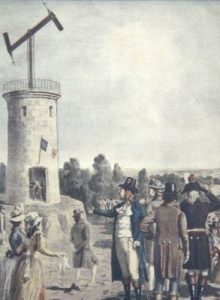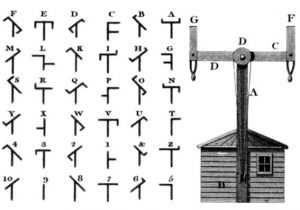The Semaphore Machine
 Communication over the years has not always been easy. Before mail service, the people sent messages via horse and riders, called post riders. I’m sure that messages were only sent in this way when the message was really important, because it would be silly to pay someone to send a simple letter, or notes like our text messages of today. Just imagine that cost if the messages went back and forth as much as texts do. Nevertheless, post riders were the only way to get a message out in 1791. Inventions happen at a time when they are least expected, and just because it was 1791, doesn’t mean that the next year couldn’t bring something amazing. In this case, that is exactly what happened.
Communication over the years has not always been easy. Before mail service, the people sent messages via horse and riders, called post riders. I’m sure that messages were only sent in this way when the message was really important, because it would be silly to pay someone to send a simple letter, or notes like our text messages of today. Just imagine that cost if the messages went back and forth as much as texts do. Nevertheless, post riders were the only way to get a message out in 1791. Inventions happen at a time when they are least expected, and just because it was 1791, doesn’t mean that the next year couldn’t bring something amazing. In this case, that is exactly what happened.
After seeing the problems there were with communications, Claude Chappe of France invented a system of communication that he called the Semaphore Machine. In reality it was an early  form of the telegraph system we all know about. The machine was used until the nineteenth century when the telegraph was invented. The Semaphore system was much faster than post riders for conveying a message over long distances, and also had cheaper long-term operating costs, once constructed. The system worked by conveying information by means of visual signals, using towers with pivoting shutters, also known as blades or paddles. Information is encoded by the position of the shutters. It is read when the shutter is in a fixed position. The lines were a precursor to the electrical telegraph. It was also considered more private, which seems odd to me. How could a message relayed from the top of a tower be private? Of course, not everyone knew how to read the messages, but it would seem like there would be a few people who learned the codes and so could read the messages. Still, I suppose that the people who translated the messages were sworn to secrecy.
form of the telegraph system we all know about. The machine was used until the nineteenth century when the telegraph was invented. The Semaphore system was much faster than post riders for conveying a message over long distances, and also had cheaper long-term operating costs, once constructed. The system worked by conveying information by means of visual signals, using towers with pivoting shutters, also known as blades or paddles. Information is encoded by the position of the shutters. It is read when the shutter is in a fixed position. The lines were a precursor to the electrical telegraph. It was also considered more private, which seems odd to me. How could a message relayed from the top of a tower be private? Of course, not everyone knew how to read the messages, but it would seem like there would be a few people who learned the codes and so could read the messages. Still, I suppose that the people who translated the messages were sworn to secrecy.
The system did have its drawbacks. The distance that this optical telegraph could bridge was limited by geography and weather. It could not be seen in rain or snow, and could not be seen over a hill. That limited its  practical use. The solution was to use relay stations to reach longer distances. Of course, the system couldn’t cross expanses of water, unless a convenient island could be used for a relay station. While the system had its problems, it did serve a useful purpose in its time. In some forms, it is still used today. One modern version of the semaphore system is a flag semaphore, or a flag relay system. Another is the heliograph, which is an optical telegraph using mirror-directed sunlight reflections. I think anyone who has watched a movie about ships might recognize that one. It was how they signaled from one ship to another. Maybe the Semaphore Telegraph system wasn’t so antiquated after all.
practical use. The solution was to use relay stations to reach longer distances. Of course, the system couldn’t cross expanses of water, unless a convenient island could be used for a relay station. While the system had its problems, it did serve a useful purpose in its time. In some forms, it is still used today. One modern version of the semaphore system is a flag semaphore, or a flag relay system. Another is the heliograph, which is an optical telegraph using mirror-directed sunlight reflections. I think anyone who has watched a movie about ships might recognize that one. It was how they signaled from one ship to another. Maybe the Semaphore Telegraph system wasn’t so antiquated after all.
- November 2024
- October 2024
- September 2024
- August 2024
- July 2024
- June 2024
- May 2024
- April 2024
- March 2024
- February 2024
- January 2024
- December 2023
- November 2023
- October 2023
- September 2023
- August 2023
- July 2023
- June 2023
- May 2023
- April 2023
- March 2023
- February 2023
- January 2023
- December 2022
- November 2022
- October 2022
- September 2022
- August 2022
- July 2022
- June 2022
- May 2022
- April 2022
- March 2022
- February 2022
- January 2022
- December 2021
- November 2021
- October 2021
- September 2021
- August 2021
- July 2021
- June 2021
- May 2021
- April 2021
- March 2021
- February 2021
- January 2021
- December 2020
- November 2020
- October 2020
- September 2020
- August 2020
- July 2020
- June 2020
- May 2020
- April 2020
- March 2020
- February 2020
- January 2020
- December 2019
- November 2019
- October 2019
- September 2019
- August 2019
- July 2019
- June 2019
- May 2019
- April 2019
- March 2019
- February 2019
- January 2019
- December 2018
- November 2018
- October 2018
- September 2018
- August 2018
- July 2018
- June 2018
- May 2018
- April 2018
- March 2018
- February 2018
- January 2018
- December 2017
- November 2017
- October 2017
- September 2017
- August 2017
- July 2017
- June 2017
- May 2017
- April 2017
- March 2017
- February 2017
- January 2017
- December 2016
- November 2016
- October 2016
- September 2016
- August 2016
- July 2016
- June 2016
- May 2016
- April 2016
- March 2016
- February 2016
- January 2016
- December 2015
- November 2015
- October 2015
- September 2015
- August 2015
- July 2015
- June 2015
- May 2015
- April 2015
- March 2015
- February 2015
- January 2015
- December 2014
- November 2014
- October 2014
- September 2014
- August 2014
- July 2014
- June 2014
- May 2014
- April 2014
- March 2014
- February 2014
- January 2014
- December 2013
- November 2013
- October 2013
- September 2013
- August 2013
- July 2013
- June 2013
- May 2013
- April 2013
- March 2013
- February 2013
- January 2013
- December 2012
- November 2012
- October 2012
- September 2012
- August 2012
- July 2012
- June 2012
- May 2012
- April 2012
- March 2012
- February 2012
- January 2012
- December 2011
- November 2011
- October 2011
- September 2011
- August 2011
- July 2011
- June 2011
- May 2011
- April 2011
- March 2011
- February 2011
- January 2011
- December 2010
- August 2010
- July 2010


Leave a Reply